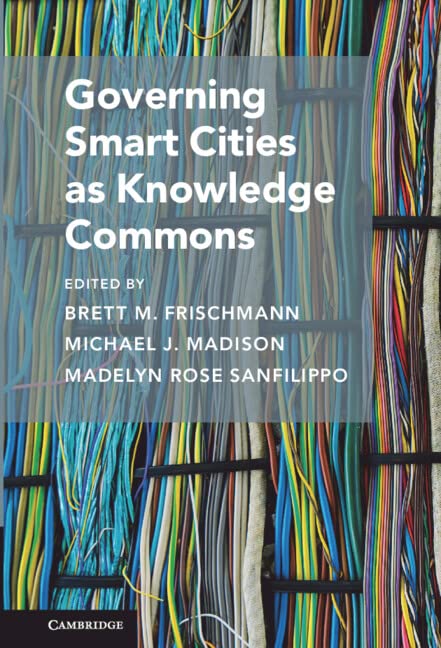
The rise of ‘smart’ – or technologically advanced – cities has been well documented, while governance of such technology has remained unresolved. Integrating surveillance, AI, automation, and smart tech within basic infrastructure as well as public and private services and spaces raises a complex set of ethical, economic, political, social, and technological questions. The Governing Knowledge Commons (GKC) framework provides a descriptive lens through which to structure case studies examining smart tech deployment and commons governance in different cities. This volume deepens our understanding of community governance institutions, the social dilemmas communities face, and the dynamic relationships between data, technology, and human lives. For students, professors, and practitioners of law and policy dealing with a wide variety of planning, design, and regulatory issues relating to cities, these case studies illustrate options to develop best practice
Reviews
“Governing smart cities – or governing cities of any type – is one of the most important and understudied issues facing cities, societies, and economies today. The collection of essays in Governing Smart Cities as Knowledge Commons helps us better understand the key policy and regulatory issues at play and what they portend of the future of our cities.”
Richard Florida, University Professor, Professor of Economic Analysis and Policy, Distinguished Scholar-in-Residence, School of Cities, University of Toronto and author of “The Rise of the Creative Class”
“In this new addition to the ground-breaking governing knowledge commons series, editors Frischmann, Madison, and Sanfilippo have assembled an impeccable cast of global thought leaders to examine a topic that in many ways has never been more pressing, the governance of smart cities. The privacy, security, and broader resilience themes analyzed in this volume, and the arguments built on the GKC Framework that they advocate, will help shape both academic and policy conversations in the public and private sectors for many years to come.”
Scott J. Shackelford, Professor of Law and Ethics, Indiana University Kelley School of Business and Executive Director, Ostrom Workshop at Indiana University
Read the Book via Cambridge Core (Open Access)
Introduction by Madelyn Rose Sanfilippo, Michael J. Madison, and Brett M. Frischmann
Smart Cities and Knowledge Commons by Michael J. Madison, Madelyn Rose Sanfilippo, and Brett M. Frischmann
The Challenge for Cities of Governing Spatial Data Privacy by Feiyang Sun and Jan Whittington
Open Governments, Open Data: Moving toward a Digital Commons Framework by Anjanette H. Raymond and Inna Kouper
Community Land Trusts as a Knowledge Commons: Challenges and Opportunities by Natalie Chyi and Dan Wu
Smart Tech Deployment and Governance in Philadelphia by Brett M. Frischmann and Marsha Tonkovich
The Kind of Solution a Smart City Is: Knowledge Commons and Postindustrial Pittsburgh by Michael J. Madison
Technofuturism in Play: Privacy, Surveillance, and Innovation at Walt Disney World by Madelyn Rose Sanfilippo and Yan Shvartzshnaider
Can a Smart City Exist as Commons? The Case of Automated Governance in Sidewalk Toronto by Anna Artyushina
From Thurii to Quayside: Creating Inclusive Blended Spaces in Digital Communities by Richard Whitt
A Proposal for Principled Decision-Making: Beyond Design Principles by Madelyn Rose Sanfilippo and Brett M. Frischmann
Conclusion by Brett M. Frischmann, Michael J. Madison, and Madelyn Rose Sanfilippo
About the Editors and Contributors
Editors
Contributors
Anna Artyushina is a PhD candidate at York University
Natalie Chyi is a fellow with the Internet Law & Policy Foundry
Inna Kouper is a research scientist at Indiana University, Bloomington
Feiyang Sun is a PhD candidate at the University of Washington
Dan Wu is the CEO and lead innovation advisor of Joyful Ventures